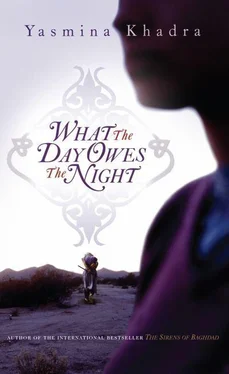One of Germaine’s nephews in Oran, a cook on the warship Dunkerque, was among the 1,297 sailors killed in the raid. My uncle, who was gradually, inexorably withdrawing into himself, refused to come to the funeral, so Germaine and I had to go without him.
The city of Oran was in a state of shock. The whole population had gathered on the docks and was staring aghast at the burning barracks. Many of the ships had been on fire since the first bombing raids, and thick clouds of black smoke now choked the city and veiled the mountains. What had happened was all the more shocking because the warships the British had bombed had been in the process of laying up, the French having signed an armistice with Germany two weeks earlier. This war that people had assumed posed no threat to this side of the Mediterranean was now on our doorstep. After the initial panic and confusion, there was mayhem. Half-truths and rumours were rife, and people seemed prepared to believe even the wildest and most terrifying stories. There was talk of a German invasion, of nightly parachute drops outside the city, of massive bombing raids targeting the civilian population and dragging Algeria into this savage war, which even now was returning all of Europe to the Stone Age.
I was desperate to get back to Río Salado.
After the funeral, Germaine gave me some money so that I could go to Jenane Jato, and asked her nephew Bertrand to go with me so he could bring me back safe and sound.
Jenane Jato looked different, larger. It sprawled now towards Petit Lac, towards the shanty towns and the camp grounds of the nomads. Scrubland was fast disappearing under the advancing concrete. Patches of waste ground and dark alleys were now building sites. The high walls of a barracks or a prison rose up where once the souk had been. Crowds milled outside employment ‘offices’ – most of which were no more than tables set up in front of vast mountains of scrap iron. Jenane Jato was different, yet poverty still clung tenaciously to the place, resistant to even the most fervent municipal projects. The same shambling shadows still hugged the walls, the same human wrecks still sprawled drunkenly in cardboard boxes; the destitute, faces ashen, shrouded like mummies in their burnous, still teemed around the filthy cafés, hoping to dip a dry crust into the smells of cooking. The poor, the drunken and the wretched stared at us as though we were time itself, as though we had appeared from some parallel universe. Whenever he heard some insult directed at us, or saw someone stare a little too long at our fine clothes, Bertrand, who had never seen a place like Jenane Jato, walked a little faster. There were roumis here and there, and some Muslims who wore European suits, fezzes perched at rakish angles, but in the air there was still the stifling smell of a storm about to break. As we walked, we happened on squabbles, some of which degenerated into brawls while others simply petered out into uneasy silence. The sense of dread was overpowering. Even the jingling dance of the water sellers, whose leather harnesses were studded with tiny bells, could not ward off the unwholesome effects.
There was far too much suffering.
Jenane Jato was crumbling beneath the weight of broken dreams. Abandoned children stumbled in their parents’ shadows, weak from starvation and sunstroke, fledgling tragedies set loose upon the world. Feral and brutish, they raced barefoot through the streets, hanging on to the backs of trucks, dashing between the carts, laughing, heedless, flirting with death. Gangs of boys fought, or played soccer with a ball of knotted rags. In their terrifying games, there was something exhilarating, something dizzyingly suicidal.
‘Makes a change from Río Salado, doesn’t it?’ Bertrand tried to smile, but he was sweating and pale with fear. I was scared too, but my terror vanished when I saw Peg-Leg standing outside his stall. The poor devil had lost a lot of weight. He looked ten years older. He gave me the same puzzled frown he had the last time he had seen me – half surprise, half delight.
‘Can you give me the address of your guardian angel, blue eyes?’ he shouted. ‘Because if there is a God, I want to know why he looks out for you and not for us lot here.’
‘That’s enough of your blasphemy,’ called the barber. ‘It’s probably your ugly mug that made God turn his back on us.’
The barber had not changed, though he now had the scar of a razor slash across his face. Jenane Jato was clearly on the move, but where it was headed I could not tell. The shacks behind the jujube hedges had been cleared away to leave a vast expanse of red clay surrounded by a wire fence into which had been dug the foundations for a bridge that was to span the railway line. Where the old barracks had stood rose the towers of a huge new factory.
Peg-Leg jerked a thumb at his jar of sweets.
‘You want one, kid?’
‘No thanks.’
Crouched beneath a rotting lamp post, a waffle-seller clicked a pair of metal castanets. He offered us waffles in paper cornets and the gleam in his eyes sent shivers down our backs. Bertrand urged me on, clearly not prepared to trust a face or a shadow in this place.
When we came to the courtyard, he said, ‘I’ll wait for you outside. Take all the time you need.’
Opposite, where Ouari’s chicken coop had once been, there was a new brick house with a low stone wall that ran along what had been the patch of waste ground where a gang of boys had once tried to lynch me. I thought about Ouari, remembered him teaching me to catch goldfinches; I wondered where he was now.
Badra peered at me when she saw me step into the courtyard. She was hanging out her washing, the hem of her dress tucked into the rainbow-coloured cord she used as a belt, revealing her bare legs. She stood, feet apart, hands on her broad hips, barring my way.
‘So it’s only now that you remember you have a family?’ Badra looked different. She had put on weight. Her strong face had slipped to join a double chin, her fearsome energy had waned and she now seemed flabby and listless.
I didn’t know whether she was teasing or scolding me.
‘Your mother and your sister are out.’ She nodded to our curtained room. ‘But they should be back soon.’
She pushed her laundry pail aside with her foot and shoved a stool towards me
‘Sit down,’ she said. ‘Kids! You’re all the same! You suckle till you’ve sucked us dry, and as soon as you learn to walk, you clear off and leave us to starve. You’re just like your fathers; you creep out and you don’t give a thought to what happens to us.’
She turned and went back to hanging out her laundry. I could see only her shoulders rising and falling. She stopped for a moment to wipe her nose or brush away a tear, shook her head then went back to hanging clothes on the old hemp washing line that bisected the courtyard.
‘Your mother’s not been well,’ she said. ‘Not well at all. I’m sure something terrible has happened to your father, but she won’t believe it. Lots of men walk out on their families, they go away and start again somewhere. But that’s not the only possibility . . . There’s a lot of violence these days. I’ve got a bad feeling about your father. I think he was murdered and dumped in a ditch. He was a good man, not the kind of man who walks out on his kids. I’m sure he’s dead. Like my poor husband. Cut down for three soldies – three lousy cents. In broad daylight they killed him – stabbed him in the middle of the street. A single stab and it was all over. How can it be so easy for a man to die when he has hungry mouths to feed? How could he let himself be stabbed in the back by a kid not much older than you are?’
Badra chattered on, never pausing for breath, as though someone had opened up a Pandora’s box inside her. It was as though this was all there was left for her: to talk about her tragedies, a casual gesture here, a sudden silence there. Above the clothes she was hanging out I could see her shoulders; beneath them, her bare legs, and sometimes, in the gap between the clothes, a glimpse of her plump hips. She told me that Bliss had evicted the beautiful Hadda, with her two kids trailing after her and nothing but a bundle of clothes. She told me that one night, when her drunken husband beat her yet again, poor Yezza had thrown herself into the well and killed herself. She told me how Batoul, the psychic, who had managed to extort a tidy sum from the poor wretches who came to consult her, finally amassed enough to buy a house and a Turkish hammam in the Village Nègre, and she told me about the new tenant who had shown up from God knew where and, in the afternoon, when all the shutters were closed, admitted every kind of deviant into her room. Badra told me that Bliss, now there were no men living in the courtyard, had become a pimp.
Читать дальше












